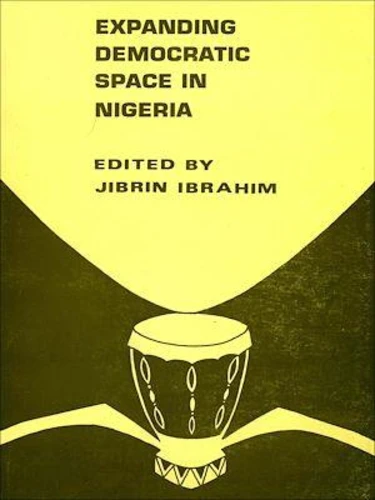Expanding democratic space in Nigeria
Par :Formats :
Disponible dans votre compte client Decitre ou Furet du Nord dès validation de votre commande. Le format ePub est :
- Compatible avec une lecture sur My Vivlio (smartphone, tablette, ordinateur)
- Compatible avec une lecture sur liseuses Vivlio
- Pour les liseuses autres que Vivlio, vous devez utiliser le logiciel Adobe Digital Edition. Non compatible avec la lecture sur les liseuses Kindle, Remarkable et Sony
 , qui est-ce ?
, qui est-ce ?Notre partenaire de plateforme de lecture numérique où vous retrouverez l'ensemble de vos ebooks gratuitement
Pour en savoir plus sur nos ebooks, consultez notre aide en ligne ici
- Nombre de pages272
- FormatePub
- ISBN978-2-86978-968-5
- EAN9782869789685
- Date de parution01/01/2020
- Protection num.Digital Watermarking
- Taille635 Ko
- Infos supplémentairesepub
- ÉditeurCODESRIA
Résumé
Establishing, broadening and maintaining democracy in Africa is an issue with world wide implications. On the continent itself, democracy is a vital issue, precisely because the majority of Africans have been reduced to virtual outlaws, with little or no rights in their own countries. This process has been driven by their own governments. Atrocities, suppression and violence has occurred all over the continent in the suppression of democratic freedom.
What is astounding is that after such suffering, the threshold of tolerance breaks and citizens seek ways to exercise some freedom from daily oppression. Nigeria, particularly in its current state, is no exception. Written by African social scientists, Expanding Democratic Space in Nigeria makes an essential contribution to the ongoing debate and analysis of the potential for barriers to democratic space.
Chapters highlight the role of different interest groups, the implications of the country's colonial past and the legacy of military, the role of the mass media and women's participation in the political arena. Intellectuals, trade unions, human rights organisations and young people are all featured, as they take their place in what the authors see as an inevitable move towards a freer stale.
What is astounding is that after such suffering, the threshold of tolerance breaks and citizens seek ways to exercise some freedom from daily oppression. Nigeria, particularly in its current state, is no exception. Written by African social scientists, Expanding Democratic Space in Nigeria makes an essential contribution to the ongoing debate and analysis of the potential for barriers to democratic space.
Chapters highlight the role of different interest groups, the implications of the country's colonial past and the legacy of military, the role of the mass media and women's participation in the political arena. Intellectuals, trade unions, human rights organisations and young people are all featured, as they take their place in what the authors see as an inevitable move towards a freer stale.
Establishing, broadening and maintaining democracy in Africa is an issue with world wide implications. On the continent itself, democracy is a vital issue, precisely because the majority of Africans have been reduced to virtual outlaws, with little or no rights in their own countries. This process has been driven by their own governments. Atrocities, suppression and violence has occurred all over the continent in the suppression of democratic freedom.
What is astounding is that after such suffering, the threshold of tolerance breaks and citizens seek ways to exercise some freedom from daily oppression. Nigeria, particularly in its current state, is no exception. Written by African social scientists, Expanding Democratic Space in Nigeria makes an essential contribution to the ongoing debate and analysis of the potential for barriers to democratic space.
Chapters highlight the role of different interest groups, the implications of the country's colonial past and the legacy of military, the role of the mass media and women's participation in the political arena. Intellectuals, trade unions, human rights organisations and young people are all featured, as they take their place in what the authors see as an inevitable move towards a freer stale.
What is astounding is that after such suffering, the threshold of tolerance breaks and citizens seek ways to exercise some freedom from daily oppression. Nigeria, particularly in its current state, is no exception. Written by African social scientists, Expanding Democratic Space in Nigeria makes an essential contribution to the ongoing debate and analysis of the potential for barriers to democratic space.
Chapters highlight the role of different interest groups, the implications of the country's colonial past and the legacy of military, the role of the mass media and women's participation in the political arena. Intellectuals, trade unions, human rights organisations and young people are all featured, as they take their place in what the authors see as an inevitable move towards a freer stale.





